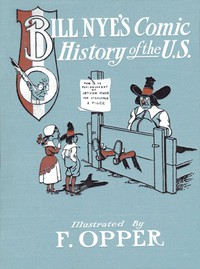Comic History of the United States by Bill Nye (book series for 10 year olds txt) 📗

- Author: Bill Nye
Book online «Comic History of the United States by Bill Nye (book series for 10 year olds txt) 📗». Author Bill Nye
But the Union army was cooped up on the James River. The siege of Richmond had been abandoned, and the North felt blue and discouraged. Three hundred thousand more men were called for, and it seemed that, as in the South, "the cradle and the grave were to be robbed" for more troops.
Lee now decided to take Washington and butcher Congress to make a Roman holiday. General Pope met the Confederates August 26, and while Lee and Jackson were separated could have whipped the latter had the Army of the Potomac reinforced him as it should, but, full of malaria and foot-sore with marching, it did not reach him in time, and Pope had to fight the entire Confederate army on that historic ground covered with so many unpleasant memories and other things, called Bull Run.
WHERE BEER WAS ONLY FIVE CENTS PER GLASS.
For the second time the worn and wilted Union army was glad to get back to Washington, where the President was, and where beer was only five cents per glass.
Oh, how sad everything seemed at that time to the North, and how high cotton cloth was! The bride who hastily married her dear one and bade him good-by as the bugle called him to the war,[Pg 271] pointed with pride to her cotton clothes as a mark of wealth; and the middle classes were only too glad to have a little cotton mixed with their woollen clothes.
WANTS HIS MONEY'S WORTH WHEN
HE PAYS FOR A BATTLE.
Lee invaded Maryland, and McClellan, restored to command of the Army of the Potomac, followed him, and found a copy of his order of march, which revealed the fact that only a portion of the army was before him. So, overtaking the Confederates at South Mountain, he was ready for a victory,[Pg 272] but waited one day; and in the mountains Lee got his troops united again, while Jackson also returned. The Union troops had over eighty thousand in their ranks, and nothing could have been more thoughtful or genteel than to wait for the Confederates to get as many together as possible, otherwise the battle might have been brief and unsatisfactory to the tax-payer or newspaper subscriber, who of course wants his money's worth when he pays for a battle.
The battle of Antietam was a very fierce one, and undecisive, yet it saved Washington from an invasion by the Confederates, who would have done a good deal of trading there, no doubt, entirely on credit, thus injuring business very much and loading down Washington merchants with book accounts, which, added to what they had charged already to members of Congress, would have made times in Washington extremely dull.
General McClellan, having impressed the country with the idea that he was a good bridge-[Pg 273]builder, but a little too dilatory in the matter of carnage, was succeeded by General Burnside.
President Lincoln had written the Proclamation of Emancipation to the slaves in July, but waited for a victory before publishing it. Bull Run as a victory was not up to his standard; so when Lee was driven from Maryland the document was issued by which all slaves in the United States became free; and, although thirty-one years have passed at this writing, they are still dropping in occasionally from the back districts to inquire about the truth of the report.
STILL DROPPING IN OCCASIONALLY FROM THE BACK DISTRICTS.
[Pg 274]
CHAPTER XXVII. STILL MORE FRATERNAL BLOODSHED, ON PRINCIPLE.—OUTING FEATURES DISAPPEAR, AND GIVE PLACE TO STRAINED RELATIONS BETWEEN COMBATANTS, WHO BEGIN TO MIX THINGS.On December 13 the year's business closed with the battle of Fredericksburg, under the management of General Burnside. Twelve thousand Union troops were killed before night mercifully shut down upon the slaughter.
The Confederates were protected by stone walls and situated upon a commanding height, from which they were able to shoot down the Yankees with perfect sang-froid and deliberation.
In the midst of all these discouragements, the red brother fetched loose in Minnesota, Iowa, and Dakota, and massacred seven hundred men, women, and children. The outbreak was under the management of Little Crow, and was confined to the Sioux Nation. Thirty-nine of these Indians were hanged on the same scaffold at Mankato, Minnesota, as a result of this wholesale murder.
This execution constitutes one of the green spots in the author's memory. In all lives now[Pg 275] and then an oasis is liable to fall. This was oasis enough to last the writer for years.
In 1863 the Federal army numbered about seven hundred thousand men, and the Confederates about three hundred and fifty thousand. Still it took two more years to close the war.
It is held now by good judges that the war was prolonged by the jealousy existing between Union commanders who wanted to be President or something else, and that it took so much time for the generals to keep their eyes on caucuses and county papers at home that they fought best when surprised and attacked by the foe.
General Grant moved again on Vicksburg, and on May 1, defeated Pemberton at Fort Gibson. He also prevented a junction between Joseph E. Johnston and Pemberton, and drove the latter into Vicksburg, securing the stopper so tightly that after forty-seven days the garrison surrendered, July 4. This fight cost the Confederates thirty-seven thousand prisoners, ten thousand killed and wounded, and immense quantities of stores. It was a warm time in Vicksburg; a curious man who stuck his hat out for twenty seconds above the ramparts found fifteen bullet-holes in it when he took it down, and when he wore it to church he attracted more attention than the collection.
The North now began to sit up and take notice.[Pg 276] Morning papers began to sell once more, and Grant was the name on every tongue.
The Mississippi was open to the Gulf, and the Confederacy was practically surrounded.
ATTRACTED MORE ATTENTION THAN THE COLLECTION.
Rosecrans would have moved on the enemy, but learned that the foe had several head of cavalry more than he did, also a team of artillery. At this time John Morgan made a raid into Ohio. He surrounded Cincinnati, but did not take it, as he was not keeping house at the time and hated to pay storage on it. He got to Parkersburg, West Virginia, and was captured there with almost his entire force.[Pg 277]
On September 19 and 20 occurred the battle of Chickamauga. Longstreet rushed into a breach in the Union line and swept it with a great big besom of wrath with which he had wisely provided himself on starting out. Rosecrans felt mortified when he came to himself and found that his horse had been so unmanageable that he had carried him ten miles from the carnage.
But the left, under Thomas, held fast its position, and no doubt saved the little band of sixty thousand men which Rosecrans commanded at the time.
His army now found itself shut up in intrenchments, with Bragg on the hills threatening the Union forces with starvation.
On November 24-25 a battle near Chattanooga took place, with Grant at the head of the Federal forces. Hooker came to join him from the Army of the Potomac, and Sherman hurried to his standard from Iuka. Thomas made a dash and captured Orchard Knob, and Hooker, on the following day, charged Lookout Mountain.
This was the most brilliant, perhaps, of Grant's victories. It is known as the "battle of Missionary Ridge." Hooker had exceeded his prerogative and kept on after capturing the crest of Lookout Mountain, while Sherman was giving the foe several varieties of fits, from the north, when Grant discovered that before him the line was[Pg 278] being weakened in order to help the Confederate flanks. So with Thomas he crossed through the first line and over the rifle-pits, forgot that he had intended to halt and reform, and concluded to wait and reform after the war was over, when he should have more time, and that night along the entire line of heights the camp-fires of the Union army winked at one another in ghoulish glee.
The army under Bragg was routed, and Bragg resigned his command.
Burnside, who had been relieved of the command of the Army of the Potomac, was sent to East Tennessee, where the brave but frost-bitten troops of Longstreet shut him up at Knoxville and compelled him to board at the railroad eating-house there.
Sherman's worn and weary boys were now ordered at once to the relief of Burnside, and Longstreet, getting word of it, made a furious assault on the former, who repulsed him with loss, and he went away from there as Sherman approached from the west.
"WHERE AM I?"
Hooker had succeeded Burnside in the command of the Army of the Potomac, and he judged that, as Lee was now left with but sixty thousand men, while the Army of the Potomac contained one hundred thousand who craved out-of-door exercise, he might do well to go and get Lee, returning in the cool of the evening. Lee, how[Pg 279]ever, accomplished the division of his army while concealed in the woods and sent Jackson to fall on Hooker's rear. The close of the fight found Hooker on his old camping-ground opposite Fredericksburg, murmuring to himself, in a dazed sort of way, "Where am I?" Lee felt so good over this that he decided to go North and get something to eat. He also decided to get catalogues and price-lists of Philadelphia and New York while there. Threatening Baltimore in order to mislead[Pg 280] General Meade, who was now in command of the Federals, Lee struck into Pennsylvania and met with the Union cavalry a little west of Gettysburg on the Chambersburg road. It is said that Gettysburg was not intended by either army as the site for the battle, Lee hoping to avoid a fight, depending as he did on the well-known hospitality of the Pennsylvanians, and Meade intending to have the fight at Pipe Creek, where he had some property.
July 1-2-3 were the dates of this memorable battle. The first day was rather favorable to Lee, quite a number of Yankee prisoners being taken while they were lost in the crowded streets of Gettysburg.
The second day was opened by Longstreet, who charged the Union left, and ran across Sickles, who had by mistake formed in the way of Meade's intended line of battle. They outflanked him, but, as they swung around him, Warren met them with a diabolical welcome, which stayed them. Sickles found himself on Cemetery Ridge, while the Confederates under Ewell were on Culp's Hill.
On the third day, at one P.M., Lee opened with one hundred and fifty guns on Cemetery





Comments (0)